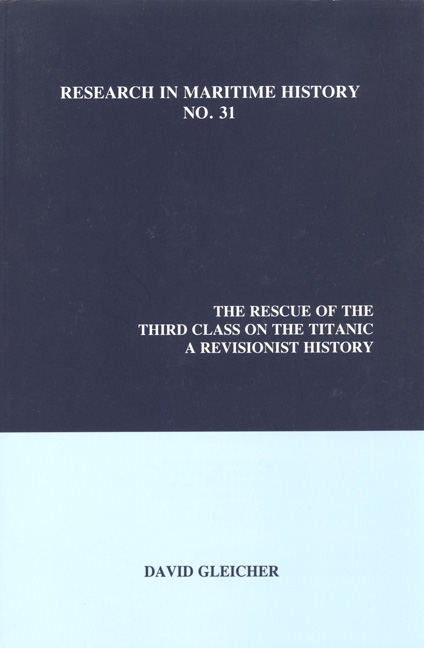Book contents
- Frontmatter
- Dedication
- Table of Contents
- List of Tables in the Text
- List of Illustrations
- Preface
- Notes on the Text
- Introduction
- Chapter 1 The “Popular Story”
- Chapter 2 The Nature Theatre of Oklahoma
- Chapter 3 Except the Rules
- Chapter 4 Departures
- Chapter 5 Like Wild Beasts Ready to Spring
- Chapter 6 Loose Ends
- Chapter 7 A Statistical Study
- Chapter 8 In Conclusion
- Appendix 1 Groupings of Nationalities into Regions
- Appendix 2 Routes to the Lifeboats
- Appendix 3 Deck Plans
- Bibliography
Chapter 4 - Departures
- Frontmatter
- Dedication
- Table of Contents
- List of Tables in the Text
- List of Illustrations
- Preface
- Notes on the Text
- Introduction
- Chapter 1 The “Popular Story”
- Chapter 2 The Nature Theatre of Oklahoma
- Chapter 3 Except the Rules
- Chapter 4 Departures
- Chapter 5 Like Wild Beasts Ready to Spring
- Chapter 6 Loose Ends
- Chapter 7 A Statistical Study
- Chapter 8 In Conclusion
- Appendix 1 Groupings of Nationalities into Regions
- Appendix 2 Routes to the Lifeboats
- Appendix 3 Deck Plans
- Bibliography
Summary
Who and How
By the outset of the third phase at 1 AM, 500-600 passengers had congregated at the extreme after end, from the after Well and Poop Decks down to the alleyway on E Deck. About half were Third Class men who had arrived from the stern in the first two phases, and the remainder were Third Class women and children and Second Class men. During the second phase, five of the six lifeboats on the forward end - Lifeboat 4 still remained on A Deck - had been launched from the Boat Deck with about 120 First Class passengers (see table 4). And all the boats on the after end had been prepared for loading and launching. The third phase lasted only forty minutes, ending at 1:40 AM with the launch of Collapsible C. During this phase eight lifeboats on the after end and the collapsible were launched with roughly 360 passengers, the vast majority Second and Third Class women and children. The next two chapters concern the activities atop the ship: the preparing, loading and launching of the various lifeboats in relation to the Third Class passengers.
We begin by discussing the authority and responsibilities of those in charge of the lifeboats. The formal authority vested in the offices of captain and senior officer has been summarized by D.E. Bristow.
The master's word is law aboard the ship…The master legally is always responsible for everything that happens to the ship, whether the master is on the bridge, or elsewhere in the ship, or even ashore…Senior officers are the watchkeepers [emphasis in original], or watch officers, meaning that they are in full charge of the ship when they are on duty and the master is not on the bridge, and they make the emergency decisions. They have their standing orders, they obey them completely, and call the master only when the circumstances warrant it according to the master's instructions.
With this in mind we assume - and there is no evidence to the contrary - that the fundamental decisions were made by Captain Smith.
- Type
- Chapter
- Information
- The Rescue of the Third Class on the TitanicA Revisionist History, pp. 105 - 160Publisher: Liverpool University PressPrint publication year: 2006



